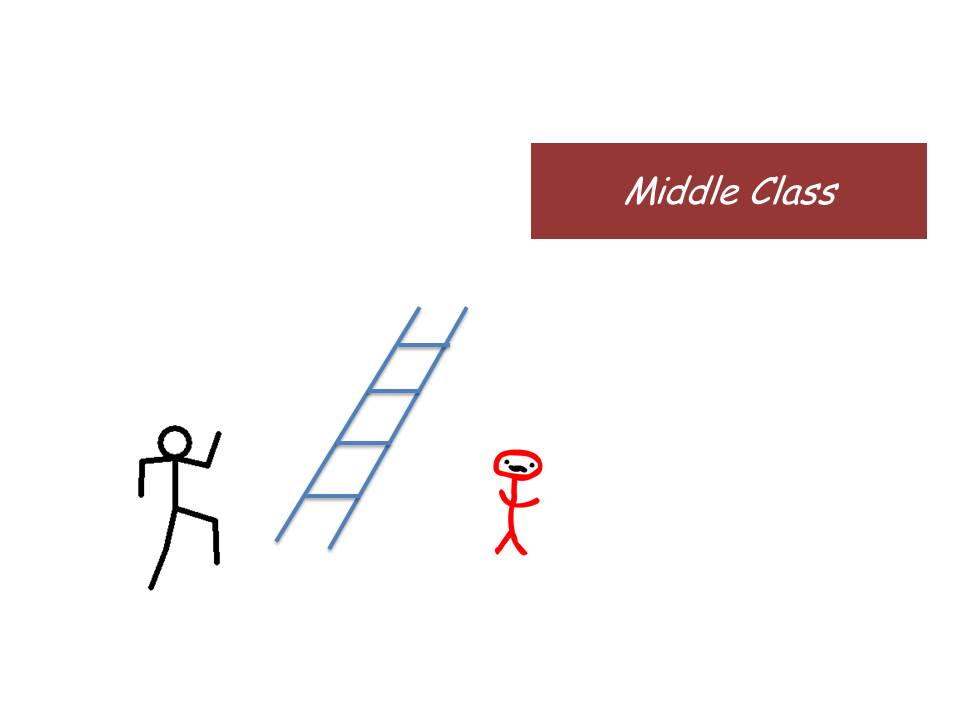February 3, 2015
Social escalator broken: Carol Goar on Pearson event
By Carol Goar
From thestar.com

Published on Tue Jan 20 2015
Pollster probes middle class angst and finds Justin Trudeau’s approach wanting.
Justin Trudeau is half right about Canada’s financially stretched middle class, says Craig Worden, vice-president of Pollara. His firm has just completed a detailed survey of what worries voters.
It is true that the 52 per cent of Canadians who describe themselves as middle class are concerned about their jobs, their ability to pay their bills, their lack of retirement savings and their children’s prospects. The Liberal leader has put his finger on a real problem.
But it is bigger than he thinks. A substantial chunk of the adult population — 45 per cent — is trapped below the middle class. They think they’re stuck there for life, no matter how hard they work.
“The key finding (of the poll) is that Canadians have very low confidence in their social mobility,” Worden said. “They don’t think they can move up.”
Focusing solely on middle class insecurity would exclude almost half of the electorate, he warned. It would be smarter to “make the middle class a safe home and an attainable destination.”
Worden spoke at a panel discussion organized by the Pearson Centre for Progressive Policy, a two-year-old think tank dedicated to making government a positive force in people’s lives. Its president, Andrew Cardozo, commissioned the poll last November to get a clearer picture of the middle class: how big it is, who is included and what its priorities are.
Pollara did not attempt to define or quantify the middle class. It merely asked Canadians to identify themselves as poor, working class, middle class or upper class. The survey (conducted online using a random sample of 1,003 Canadians) reflected the same sense of precariousness reported by researchers from United Way and McMaster University two years ago. It echoed what social activists have been saying for five years.
What was new — and disturbing — was the respondents’ loss of the faith in the value of hard work and the possibility of doing better.
It popped up in indicator after indicator:
- Half of Canadians (49 per cent) said they were worse off financially than their parents.
- More than half (55 per cent) were pessimistic about the employment outlook for their adult children.
- Eight out of 10 working Canadians said their salaries were not keeping pace with the cost of living.
- More than three-quarters (79 per cent) were worried about being able to afford health care as they aged.
- A sizeable majority (85 per cent) agreed that “income inequality is no longer about the gap between rich and poor; but between the very rich and everyone else.”
For Cardozo “the significant lack of public confidence that merit-based social mobility exists in Canadian society,” was one of the most troubling findings of the survey. He asked each of the panelists — Jim Stanford, economist for Unifor, the country’s largest private-sector union; Elizabeth McIsaac, president of the Maytree Foundation; and Bill Morneau, executive chair of employee benefits provider Morneau Shepell and Liberal candidate for Toronto Centre — to suggest policies that would provide relief.
What people need most is a firm floor under their feet, Morneau said. They’re afraid of losing their jobs. They have no financial cushion. “We should be looking at policies that offer stability,” he said. “Employment insurance is not working at all to benefit the middle class.”
McIsaac proposed starting at the local level. “We need tools to get young people into the labour force,” she said. She called for more internship opportunities, more mentoring by full-time employees and more community benefit agreements (in which developers are required to provide neighbourhood improvements, first jobs for youth, on-site training, or support for social enterprises to win infrastructure contracts).
Stanford, partly to be provocative, said it would require “a complete social and economic restructuring” to offer Canadians a decent lifestyle in the era of global corporations. National governments gave up the ability to act in the public interest 25 years ago by signing free trade agreements that ceded collective decision-making to the marketplace, he argued.
Trudeau will need more rigorous thinking than this to craft an election platform that appeals to a broad swath of voters, engenders hope and addresses the widening gap between the prosperous few and the straitened many.
But the overarching theme of the discussion was clear. Catering to one segment of the population — even a vote-loaded segment — is a short-sighted path to power.
Continue reading (external link) »
Carol Goar is a columnist for the Star.



